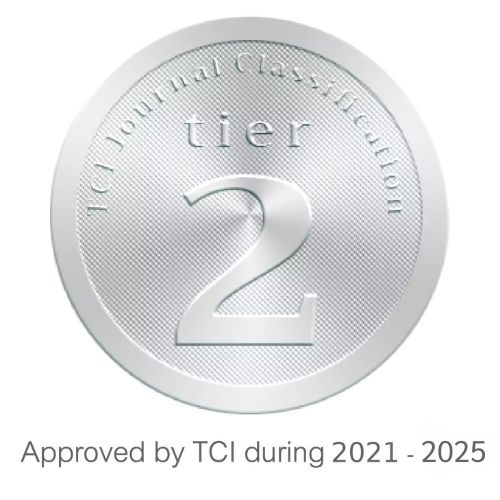เจนเนอเรชันซีกับแนวปฏิบัติด้านการจัดการทรัพยากรมนุษย์ ภายหลังการแพร่ระบาดโควิด-19
Generation Z and Human Resource Management Practices in Post COVID-19 Pandemic
Keywords:
เจนเนอเรชันซี, การลาออกครั้งยิ่งใหญ่, การจัดการทรัพยากรมนุษย์ภายหลังการแพร่ระบาดโคโรนาไวรัสสายพันธุ์ใหม่Abstract
จากปัญหาการลาออกครั้งยิ่งใหญ่โดยเฉพาะอย่างยิ่งกลุ่มแรงงานเจนเนอเรชันซี งานวิจัยนี้มีวัตถุประสงค์เพื่อศึกษาความคาดหวังการทำงานของแรงงานเจนเนอเรชันซีและแนวปฏิบัติด้านการจัดการทรัพยากรมนุษย์ภายหลังสถานการณ์วิกฤต COVID-19 งานวิจัยเชิงสำรวจนี้เก็บข้อมูลเปรียบเทียบความคาดหวังการทำงานของแรงงานเจนเนอเรชันซีก่อนสถานการณ์ COVID-19 ปี พ.ศ.2563 จำนวน 345 คน กับข้อมูลเจนเนอเรชันซีระหว่างสถานการณ์ COVID-19 ปี พ.ศ.2564 จำนวน 275 คน ผลงานวิจัยนี้สะท้อนให้เห็นว่า แรงงานเจนเนอเรชันซีที่ทำงานภายใต้สถานการณ์การแพร่ระบาดไวรัสโคโรน่าสายพันธุ์ใหม่ หรือ COVID-19 กว่า 2 ปีที่ผ่านมา ส่งผลให้มุมมองและความคาดหวังการทำงานเปลี่ยนแปลงไปจากก่อนสถานการณ์ COVID-19 โดยเฉพาะอย่างยิ่ง ความคาดหวังสถานะการทำงาน สภาพแวดล้อมการทำงาน และความรับผิดชอบต่อสังคม ซึ่งเสียงสะท้อนของแรงงานเจนเนอเรชันซีกับประเด็นความคาดหวังดังกล่าวภายหลังจากสถานการณ์ COVID-19 ต้องการให้บริษัทปรับการทำงานแบบยืดหยุ่น ให้ออกแบบการทำงานได้ด้วยตนเองและสามารถเลือกโปรเจคการทำงานเองมากกว่าการรับมอบหมาย ตลอดจนต้องการให้บริษัทคำนึงคุณภาพชีวิตการทำงานตลอดจนความปลอดภัยพลานามัยและสุขภาพในการทำงาน เพื่อรักษาแรงงานเจนเนอเรชันซีให้ทำงานกับองค์กรในฐานะกลุ่มแรงงานที่สำคัญต่อการขับเคลื่อนองค์กรในยุคดิสรับชันReferences
Bailey, D. E.; & Kurland, N. B. (2002). A Review of Telework Research: Findings, New Directions, and Lessons for the Study of Modern Work. Journal of Organizational Behavior. 23(4): 383-400.
Bellmann, L.; & Hübler, O. (2020). Working from Home, Job Satisfaction and Work–Life Balance–Robust or Heterogeneous Links?. International Journal of Manpower. 42(3): 424-441.
Bencsik, A.; Horváth-Csikós, G.; & Juhász, T. (2016). Y and Z Generations at Workplaces. Journal of Competitiveness. 8(3): 90-106.
Cennamo, L.; & Gardner, D. (2008). Generational Differences in Work Values, Outcomes and Person-Organisation Values Fit. Journal of Managerial Psychology. 23(8): 891-906.
Collings, D. G.; McMackin, J.; Nyberg, A. J.; & Wright, P. M. (2021). Strategic Human Resource Management and COVID19: Emerging Challenges and Research Opportunities. Journal of Management Studies. 58(5): 1378-1382.
Cooke & Kim. (2018). Handbook of Human Resource Management in Asia, Oxon: Routledge
Dayaram, K.; & Burgess, K. (2021). Regulatory Challenges Facing Remote Working in Australia. In Handbook of Research on Remote Work and Worker Well-Being in the Post-COVID-19 Era. Edited by Wheatley, Daniel; Hardill, Irene; & Burglass, Sarah. Pp.202-219. Hershey, Pennsylvania: IGI Global.
Delery, J. E.; & Doty, D. H. (1996). Modes of Theorizing in Strategic Human Resource Management: Tests of Universalistic, Contingency, and Configurational Perfor mance Predictions. Academy of Management Journal. 39(4): 802-835.
Fuller, J.; & Kerr, W. (2022). The Great Resignation Didn’t Start with the Pandemic. Retrieved October 5, 2022, from https://hbr.org/2022/03/the-great-resignation-didntstart-with-the-pandemic
Hair, J.; Black, W.; Babin, B.; Anderson, R.; & Tatham, R. (2006). Multivariate Data Analysis. 6th ed. Upper Saddle River, NJ: Pearson Prentice Hall.
Hoff. (2022). How Gen Z Is Winning the Great Resignation, From Pay Increases to Better Work-Life Balance. Retrieved July 1, 2022, from https://www.businessinsider.com/gen-z-winning-great-resignation-changing-job-market-2022-6.
IntelliSurvey (2022). The Great Resignation 2022: Who Is Getting Ready to Quit and Why?. Retrieved May 1, 2022, from www.intellisurvey.com
Kristof, A. L. (1996). Person-Organization Fit: An Integrative Review of Its Conceptualizations, Measurement, and Implications. Personnel Psychology. 49(1): 1–49.
Kristof-Brown, A. L.; Zimmerman, R. D.; & Johnson, E. C. (2005). Consequences of Individuals’ Fit at Work: A Meta-Analysis of Person-Job, Person-Organization, Person-Group, and Person-Supervisor Fit. Personnel Psychology. 58(2): 281-342.
Lyons, S. (2003). An Exploration of Generational Values in Life and at Work. Ph.D. Thesis (Management). Ottawa: Carleton University.
Lyons, T.F. (1971). Role Clarity, Need for Clarity, Satisfaction, Tension, and Withdrawal. Organizational Behavior & Human Performance. 6(1): 99-110.
Parker, S. K.; Knight, C.; & Keller, A. (2020). Remote Managers are Having Trust Issues. Retrieved July 10, 2022, from https://hbr.org/2020/07/remote-managers-arehaving-trust-issues
Popaitoon, P. (2022a) Fostering Work Meaningfulness for Sustainable Human Resources: A Study of Generation Z. Sustainability. 14(6): 3626.
___________. (2022b). Human Resource Management in the Age of Disruption. Bangkok: Chula Book.
Popaitoon, S. (2018). Generation Y in the Digital Economy and Person-Organization Value Fit on Intention to Stay. Journal of HR Intelligence. 13(2): 11-33.
Popaitoon, S.; & Popaitoon, P. (2020). What are Work Values of New Workforce in Digital Economy: Generation Z and Implications in Human Resource Management. Journal of Business Administration. 43(168): 18-37.
________________________. (2022). Job Design during the COVID-19 Pandemic and Intention to Stay: Perspectives from Different Generations and Implications for Human Resource Management. Journal of Business Administration. 45(173): 23-47.
Rani, N.; & Samuel, A. (2016). A Study on Generational Differences in Work Values and Person-Organization Fit and Its Effect on Turnover Intention of Generation Y in India. Management Research Review. 39(12): 1695-1719.
Schneider, B. (1987). The People Make the Place. Personnel Psychology. 40(3): 437-453.
Twenge, J. M.; Campbell, S. M.; Hoffman, B. J.; & Lance, C. E. (2010). Generational Differences in Work Values: Leisure and Extrinsic Values Increasing, Social and Intrinsic Values Decreasing. Journal of Management. 36(5): 1117-1142.
Wang, B.; Liu, Y.; Qian, J.; & Parker, S. K. (2021). Achieving Effective Remote Working During the COVID‐19 Pandemic: A Work Design Perspective. Applied Psychology. 70(1): 16-59.








